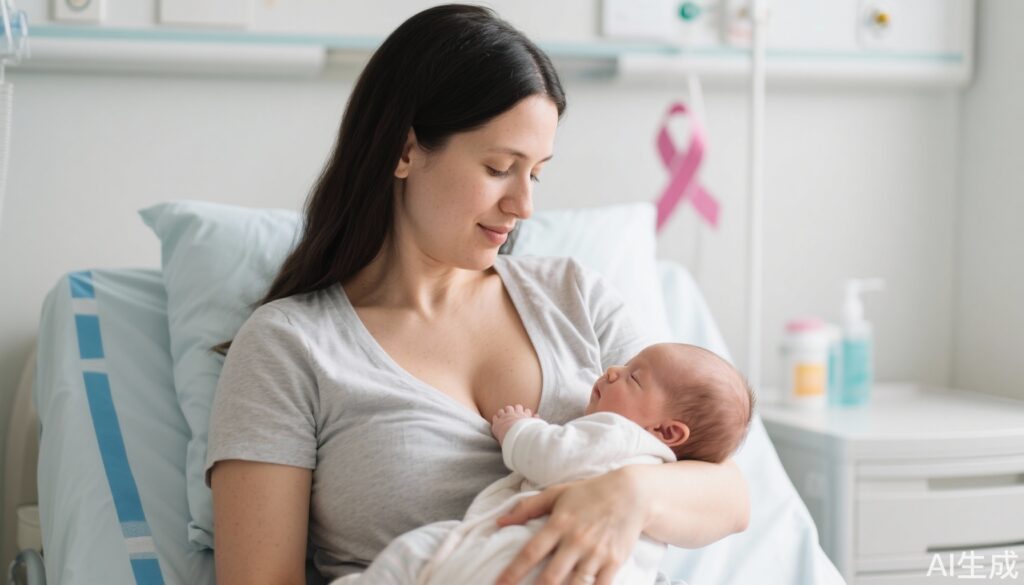Highlight
– Two thirds of women with early HR+ breast cancer breastfed after live birth post-cancer diagnosis.
– Breastfeeding duration exceeded 4 months in over half of participants.
– No increased short-term risk of breast cancer events was observed among breastfeeding women.
– Breastfeeding rates were higher among women >35 years and those without previous children.
Study Background and Disease Burden
Breast cancer (BC) is the most common malignancy in women worldwide, with hormone receptor-positive (HR+) subtype representing a large portion. Increasing numbers of young women survive early-stage HR+ BC and seek to conceive and breastfeed after their diagnosis. However, clinical guidance on the safety of breastfeeding after HR+ BC is limited due to concerns about cancer recurrence and the hormonal milieu of lactation potentially stimulating residual tumor cells. Endocrine therapy (ET), a cornerstone of HR+ BC treatment, is often paused to allow pregnancy, but the impact of breastfeeding in this context remains underexplored. This generates uncertainty for survivors about pursuing motherhood and infant feeding choices post-treatment, underscoring an unmet clinical need for evidence-based recommendations.
Study Design
The POSITIVE trial is a prospective international multicenter study (ClinicalTrials.gov NCT02308085) that enrolled women with early HR+ BC who interrupted ET to attempt pregnancy. This trial was designed primarily to assess the safety of ET interruption on breast cancer recurrence risk. The current analysis focuses on women who had a live birth during the study. It describes breastfeeding patterns including frequency, duration, and laterality (whether breastfeeding from one or both breasts) following breast-conserving surgery (BCS) or unilateral mastectomy. Additionally, it compares the cumulative incidence of breast cancer events between women who breastfed versus those who did not, over a median follow-up of 41 months.
Key Findings
Among 317 women with at least one live birth, 313 were eligible for breastfeeding analysis. A majority, 196 (62.6%), breastfed their infants. Breastfeeding frequency varied according to surgical history: 77.8% of women who had BCS breastfed and, notably, 69.2% of these women breastfed only from the unaffected breast. Among the 146 women who underwent unilateral mastectomy, 45.2% breastfed.
Breastfeeding was significantly more common among women aged over 35 years (67.6% vs. 55.7%) and those without previous children (66.4% vs. 48.5%). Duration of breastfeeding was encouragingly sustained, with a median of 4.4 months and over half (52.6%) breastfeeding for more than 4 months.
Regarding breast cancer outcomes, the cumulative incidence of breast cancer events at 24 months post-first on-study live birth was 3.6% in breastfeeding women and 3.1% in non-breastfeeding women, a negligible difference of 0.5% (95% CI, -4.3% to 5.2%). This indicates no significant short-term increase in breast cancer recurrence associated with breastfeeding after ET interruption and live birth in HR+ BC survivors.
Expert Commentary
The POSITIVE trial extends critical insights for clinicians counseling premenopausal women with HR+ breast cancer who desire pregnancy and breastfeeding. Breastfeeding is not only feasible for a substantial proportion of women post-treatment but does not appear to elevate near-term BC recurrence risk. The ability to breastfeed predominantly from the unaffected breast after BCS or even after unilateral mastectomy is reassuring.
These findings align with biological understanding that once ET is resumed post-lactation, the endocrine environment returns to suppressed levels. While longer-term data are awaited, this study challenges historic caution about breastfeeding after HR+ BC, supporting individualized shared decision-making regarding reproductive health.
Study limitations include the relatively short follow-up and the observational nature of breastfeeding behaviors, which may be confounded by patient preference and clinical advice. The trial population, highly motivated to pursue pregnancy, may not fully represent all HR+ BC survivors.
Conclusion
The POSITIVE trial demonstrates that among women with early HR+ breast cancer who interrupt ET to achieve pregnancy, two thirds successfully breastfeed for a median duration exceeding four months. Crucially, no excess risk of breast cancer events in the short term was observed linked to breastfeeding. These results provide pivotal evidence supporting breastfeeding as a safe option, empowering BC survivors who desire motherhood to make informed choices concerning lactation without compromising oncologic outcomes. Ongoing follow-up will clarify longer-term safety and guide future practice.
References
Peccatori FA, Niman SM, Partridge AH, et al. Breastfeeding After Hormone Receptor-Positive Breast Cancer: Results From the POSITIVE Trial. J Clin Oncol. 2025;43(24):2712-2719. doi:10.1200/JCO-24-02697.



